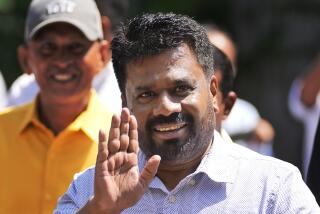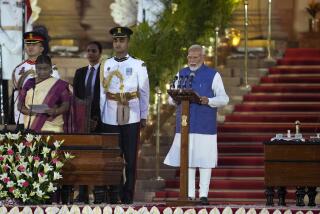India Continues to Surprise
- Share via
India keeps piling up surprises, from last week’s upset victory of the Congress Party to Tuesday’s dramatic declaration by the party’s leader, Sonia Gandhi, that she would not become prime minister. If she sticks to her decision, she deserves credit for putting the interests of her party and country ahead of her own.
National elections in the world’s most populous democracy combine spectacle, drama and, often, surprises. Because of the difficulty of getting ballots to remote locations, elections are spread over several weeks. Villagers walk or ride bullock carts to voting booths. Many are illiterate and vote on the basis of party symbols.
Despite episodes of stolen ballots and assaults on voters, the system works. The coalition led by conservative Hindu leader Atal Behari Vajpayee called elections early and campaigned on an “India shining” platform of economic prosperity. When his Bharatiya Janata Party lost to the Congress Party, Vajpayee resigned as prime minister immediately, a classy exit by a leader who deserves to be remembered for his attempt to make peace with Pakistan -- an effort critical to world security, given that both India and Pakistan are nuclear powers.
Gandhi campaigned extensively for the Congress Party, but it did not win enough seats to rule on its own. It will depend on support from communists; fears that leftists will demand an end to economic liberalization drove India’s stock market to record losses Monday. The market did better Tuesday on investors’ hopes that the new prime minister would be Manmohan Singh, architect of India’s economic reforms a decade ago. Vajpayee’s party lost because India’s hundreds of millions of poor felt bypassed by economic gains. If Singh does lead the country, his experience could make for a coalition more stable than one led by Gandhi.
The new government should beware the knee-jerk anti-Americanism that the Congress Party has sometimes favored and save its criticism for major issues. Nor should it automatically rule out help from Washington in persuading Pakistan to keep improving relations with New Delhi. Many of Vajpayee’s followers are rabid Hindu nationalists in a country with more than 100 million Muslims. One danger is that these extremists will oppose closer ties with Pakistan now that a Congress-led regime will be in power. Whoever succeeds Vajpayee as leader of the Bharatiya Janata Party should realize that the party, like all of India, would benefit from peace with the neighbor with which the country fought three wars over recent decades.
More to Read
Sign up for Essential California
The most important California stories and recommendations in your inbox every morning.
You may occasionally receive promotional content from the Los Angeles Times.













